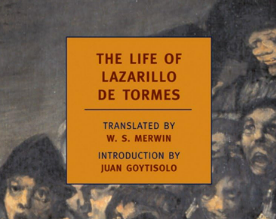Chapter IV: How They Took Lazaro through Spain
byChapter IV: How They Took Lazaro through Spain begins with Lazaro reflecting on a strange twist of fate that turned him from a man into an attraction. After miraculously surviving an ordeal at sea—one he compares to Jonah’s tale—he finds himself rescued not by kindness but by opportunists. The fishermen, eager to profit from the unusual event, decide to put him on display across the country. With the blessing of the Inquisition’s ministers, they transform him into a living exhibit. Moss is plastered across his face and chest, and seaweed hangs from his limbs to create the illusion of a sea creature. Lazaro, stunned and humiliated, watches as his human dignity is stripped away in favor of spectacle. Though he tries to object, his protests are quickly silenced. The men only see in him a chance to recover their losses—not a person, but a story to sell.
The display is carefully crafted to draw maximum curiosity from villagers and nobles alike. Lazaro, paraded as a “marine monster,” is forced to remain silent while strangers gawk and cross themselves at the sight. His words—when he dares to speak—are dismissed as tricks of the devil or the sea. Even when he tries to explain how he ended up in the water, his captors insist he was born of the ocean itself. At night, Lazaro contemplates the absurdity of his situation, wondering how quickly fortune can turn a man into a joke. One moment he was struggling for breath in a wave; the next, he’s bound in weeds and treated as less than human. When he speaks of fate, it is not with sorrow but with sarcasm, noting how easily society turns suffering into entertainment. And yet, even amid the humiliation, he remains self-aware, his mind sharp with irony.
As the journey continues, the physical burden of being moved, displayed, and silenced takes a toll. Lazaro’s strength wanes, but the mockery grows louder. Children throw pebbles, women whisper prayers, and old men speak of omens. His captors collect money at every stop, telling stories more ridiculous with each retelling. Some say Lazaro was caught in a fisherman’s net; others claim he was summoned from the deep by ancient chants. Lazaro, still alive but voiceless in the eyes of the crowd, becomes a reflection of how quickly people will believe anything if it entertains or frightens them. The truth no longer matters—it has been replaced by myth, sold one coin at a time. In this traveling theater, he is not the narrator of his life, but the prop.
Lazaro’s own thoughts become his last refuge. He remembers the words of those who once warned him about the instability of fortune and the emptiness of appearances. He knows he was not born to be a spectacle, yet that is what the world has made of him. He laughs bitterly at the irony that the Inquisition—meant to preserve truth—now sponsors his lie. Still, he endures, not because he believes it will end, but because endurance is all he has left. When he looks at the faces around him, he no longer sees cruelty, only curiosity—the kind that doesn’t think, only stares. It’s not hatred that hurts him most, but the indifference of the crowd. No one asks who he is. They only ask what he is.
Despite the humiliation, this chapter also reveals a powerful critique of society’s appetite for spectacle and its tendency to silence the vulnerable. Lazaro, a man reduced to myth, becomes a symbol of how truth is reshaped by those with power. His captors are not monsters; they are opportunists feeding a hungry audience. And that audience, blind to the man behind the costume, teaches a greater lesson about the dangers of belief unchallenged. Lazaro’s struggle is not just physical—it’s existential. He clings to his identity, quietly reminding himself of his past, even if no one else will. In doing so, he keeps a piece of himself untouched, a small defiance against a world too eager to forget the humanity of those it uses.

